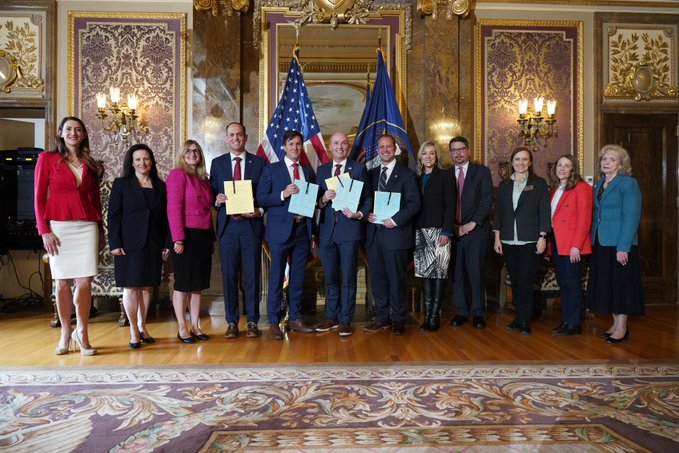
US’ Utah passes law requiring parents approval for kids to use social media
Children and young adults in Utah could lose get right of entry to to social media apps along with TikTok in the event that they don`t have parental consent and face different regulations below a first-in-the-country regulation designed to guard younger humans from the addictive structures.
Two legal guidelines signed via way of means of Republican Gov. Spencer Cox Thursday limit children below 18 from the usage of social media among the hours of 10:30 p.m. and 6:30 a.m., require age verification for all and sundry who desires to use social media withinside the nation and open the door to court cases on behalf of youngsters claiming social media harmed them. Collectively, they are seeking to save you youngsters from being lured to apps via way of means of addictive capabilities and from having advertisements promoted to them. The corporations are predicted to sue earlier than the legal guidelines take impact in March 2024.
The campaign in opposition to social media in Utah`s Republican-supermajority Legislature is the trendy mirrored image of the way politicians` perceptions of generation corporations has changed, which includes amongst commonly pro-enterprise Republicans.
Tech giants like Facebook and Google have loved unbridled boom for over a decade, however amid issues over person privateness, hate speech, incorrect information and dangerous outcomes on young adults` intellectual fitness, lawmakers have made Big Tech assaults a rallying cry at the marketing campaign path and all started seeking to rein them in as soon as in office. Utah`s regulation turned into signed at the equal day TikTok`s CEO testified earlier than Congress approximately, amongst different things, the platform`s outcomes on teenagers` intellectual fitness. But rules has stalled at the federal level, pushing states to step in.
Outside of Utah, lawmakers in pink states which includes Arkansas, Texas, Ohio and Louisiana and blue states which includes New Jersey are advancing comparable proposals. California, meanwhile, enacted a regulation ultimate yr requiring tech corporations to position children` protection first via way of means of barring them from profiling youngsters or the usage of non-public statistics in methods that might damage youngsters bodily or mentally.
The new Utah legal guidelines additionally require that dad and mom accept get right of entry to to their toddler`s debts. They define guidelines for those who need to sue over harms they declare the apps cause. If implemented, court cases in opposition to social media corporations regarding children below sixteen will shift the weight of evidence and require social media corporations display their merchandise weren`t dangerous — now no longer the opposite manner around.
Social media corporations may want to need to layout new capabilities to conform with elements of the legal guidelines that limit selling advertisements to minors and displaying them in seek results. Tech corporations like TikTok, Snapchat and Meta, which owns Facebook and Instagram, make maximum in their cash via way of means of focused on marketing and marketing to their users.
The wave of rules and its recognition on age verification has garnered pushback from generation corporations in addition to virtual privateness organizations recognised for blasting their facts series practices.
The Electronic Frontier Foundation in advance this month demanded Cox veto the Utah rules, pronouncing closing dates and age verification could infringe on young adults` rights to loose speech and privateness. Moreover, verifying each users` age could empower social media structures with greater facts, just like the government-issued identity required, they stated.
If the regulation is implemented, the virtual privateness advocacy organization stated in a statement, “the bulk of younger Utahns will discover themselves successfully locked out of a lot of the web.”
Tech enterprise lobbyists decried the legal guidelines as unconstitutional, pronouncing they infringe on humans`s proper to workout the First Amendment on line.
“Utah will quickly require on line offerings to accumulate touchy statistics approximately young adults and families, now no longer most effective to affirm ages, however to affirm parental relationships, like government-issued IDs and delivery certificates, setting their non-public facts prone to breach,” stated Nicole Saad Bembridge, an companion director at NetChoice, a tech foyer organization.
What`s now no longer clean in Utah`s new regulation and people below attention some other place is how states plan to put into effect the brand new rules. Companies are already prohibited from amassing facts on youngsters below thirteen with out parental consent below the federal Children`s Online Privacy Protection Act. To comply, social media corporations already ban children below thirteen from signing as much as their structures — however youngsters were proven to without problems get across the bans, each with and with out their dad and mom` consent.
Cox stated research have proven that point spent on social media leads to “negative intellectual fitness outcomes” for youngsters.
“We stay very constructive that we are able to be capable of byskip now no longer simply right here withinside the nation of Utah however throughout the u . s . rules that extensively modifications the connection of our kids with those very unfavourable social media apps,” he stated.
The set of legal guidelines gained help from dad and mom organizations and toddler advocates, who commonly welcomed them, with a few caveats. Common Sense Media, a nonprofit targeted on children and generation, hailed the attempt to rein in social media`s addictive capabilities and set guidelines for litigation, with its CEO pronouncing it “provides momentum for different states to preserve social media corporations responsible to make certain children throughout the u . s . are covered on line.”
However, Jim Steyer, the CEO and founding father of Common Sense, stated giving dad and mom get right of entry to to youngsters`s social media posts could “deprive children of the net privateness protections we advise for.” Age verification and parental consent might also additionally abate children who need to create debts on sure structures, however does little to prevent corporations from harvesting their facts as soon as they`re on, Steyer stated.
The legal guidelines are the trendy attempt from Utah lawmakers targeted at the fragility of youngsters withinside the virtual age. Two years ago, Cox signed rules that known as on tech corporations to mechanically block porn on cell phones and pills offered withinside the nation, after arguments approximately the risks it posed to youngsters located resonance amongst Utah lawmakers, the bulk of whom are contributors of The Church of Jesus Christ of Latter-day Saints. Amid issues approximately enforcement, lawmakers in the long run revised that rules to save you it from taking impact until 5 different states surpassed comparable legal guidelines.
The rules come as dad and mom and lawmakers are developing an increasing number of worried approximately children and teenagers` social media use and the way structures like TikTok, Instagram and others are affecting younger humans`s intellectual fitness. The risks of social media to youngsters is likewise rising as a focal point for trial lawyers, with dependancy court cases being filed thorughout the u . s ..

